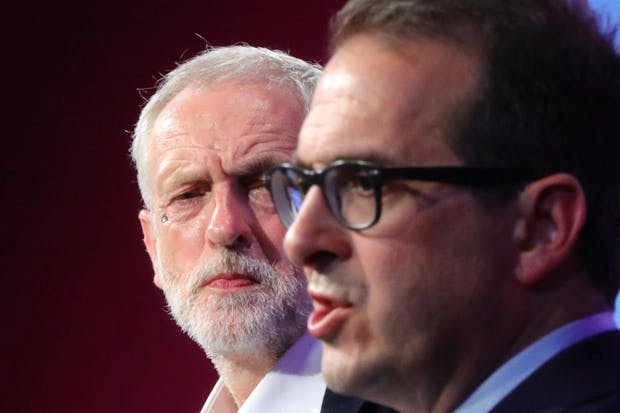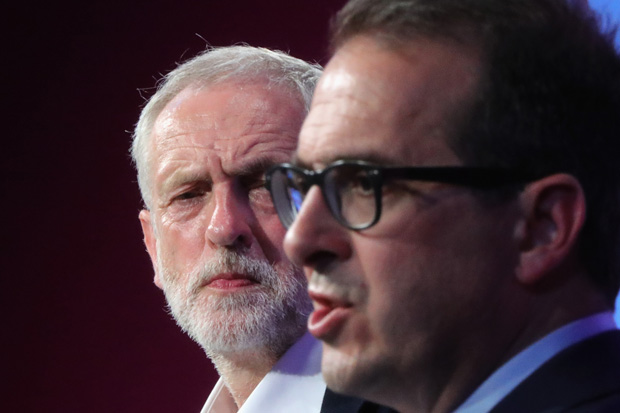All political parties are a mess: coalitions of people with different beliefs, stitched together — like Frankenstein’s monster — into a body that can grunt coherently, and perhaps even achieve something. Most of the time, these bodies lumber about reasonably effectively, if a little clumsily. But every so often, as now, when the political system is in turmoil, the suturing starts to bulge and everything seems at risk of coming apart.
Such is the case with the Labour party which may soon be torn asunder — or give way to a new grouping called the Co-operative party. There’s a certain degree of logic to this. If Jeremy Corbyn has captured Labour, and looks certain to beat Owen Smith in the current leadership contest, what do the moderates in the parliamentary party do? Some 172 of them have declared no confidence in a leader who appears impossible to dislodge. Some belong to both the Labour party and the Co-operative party — so the moderates could use their Co-op membership to form the new official opposition.
Those involved in organising the mass resignations that triggered Labour’s current leadership contest insist that this is no more than ‘pub chat’. Of course it is: very little discussed by Labour moderates amounts to more than that, which partly explains the party’s predicament. Some moderate Labour MPs have been running a shadow whipping and frontbench operation for months, so they see merit in the idea that a number of them could form a new group to work day-to-day as the official opposition.
There are 25 MPs who belong to both the Labour and Co-operative parties. But while they are moderate souls, Co-op members are Jeremy Corbyn’s target audience, and would not take kindly to their movement being used to undermine him. So this is a non-starter. Many Labour MPs will be wondering how they can serve under a leader who prefers to attend rallies where not a single Labour banner is visible among the Socialist Worker placards. Corbyn’s old-school revolutionaries have sat like hermit crabs in the Labour shell for years, but have little in common with the majority of its MPs.
The Liberal Democrats should, in theory, be ideally placed to pick up potential Labour party defectors. Many Labour moderates share with Lib Dems a faith in the state — whether it be in providing services to people, or telling them how best to live. The same can be said for the Lib Dem leader Tim Farron, and many of his members. Many differ from Labourites only in their love of using party democracy to set policy on important issues like goldfish care. There is no great point of principle that separates most Labour moderates from Lib Dem lefties.
Then there are the middle-of-the-road meddlers — the Labour right, the Tory left and what remains of the liberals in the Liberal Democrats. They believe in the individual rather than the state, and believe that the state’s role is to support individual liberty and the markets. When Cameron said he was the ‘heir to Blair’, this is what he meant: indeed, many of his reforms looked like bad imitations of Blairism. The Blairites wanted more opportunities for the markets to work, and the Cameroons wanted more opportunities to stop markets from working against people, sometimes with hilarious results involving chocolate oranges. They all see the European Union as a force for good, which means that currently the best way to identify members of this political faction is to look for the sad forlorn tail between their legs.
Then come the bastards. Or, rather, the Eurosceptics who have bedevilled Tory leaders for a generation: the ones who did for John Major; the ones who forced David Cameron to hold a referendum. They are on the eurosceptic, sometimes libertarian, right wing of the Conservative party (and the Douglas Carswell party, formerly known as Ukip). They’re not very numerous, but are commonly seen as poisonous. When Cameron went into coalition with the Liberal Democrats, it was mainly done to get away from them. They ought to be delighted with the way things have gone recently: with the Brexit vote and the promotion of Liam Fox and David Davis to the cabinet. But they might end up destabilising their party anyway, because this is just what they tend to do.
The Eurosceptics have some common cause with the hard left when it comes to Europe. They might have completely different attitudes to governing at home, but both believe the best way to achieve their aims is in smaller units, unconnected by grand political projects spanning many countries. Tony Benn was, after all, one of the most eloquent original proponents of Brexit.
So given the mismatch between all these groupings of MPs, and the party lines that are supposed to divide them, isn’t now the perfect time for political realignment?
There is a clear political appetite for a pro-European party. The SDP’s roots were in the 1975 referendum campaign: the same could happen again. But Labourites, in particular, are wary of the SDP’s experience — as ultimately it only shook, rather than recast, the foundations of the political party it split away from. And there are more personal barriers to a pro-European grouping. Whenever I have tried to cheer up a disconsolate Labour MP by suggesting they could defect to the Lib Dems, they laugh bitterly and make rude jokes about Tim Farron. And anyway, turncoats are treated terribly i n politics, never properly trusted by the team to which they defect.
Talk of political realignment in Britain usually comes to nothing. Time after time, the snow globe of Westminster has seemed so shaken up that nothing could be the same again, only for its contents to settle without any discernible difference. But if our political parties fail to reform now, they will look more and more unhealthy and unappealing to the public. And it will scare voters as effectively, and unintentionally, as Dr Frankenstein’s monster.
Got something to add? Join the discussion and comment below.
Get 10 issues for just $10
Subscribe to The Spectator Australia today for the next 10 magazine issues, plus full online access, for just $10.














Comments
Don't miss out
Join the conversation with other Spectator Australia readers. Subscribe to leave a comment.
SUBSCRIBEAlready a subscriber? Log in